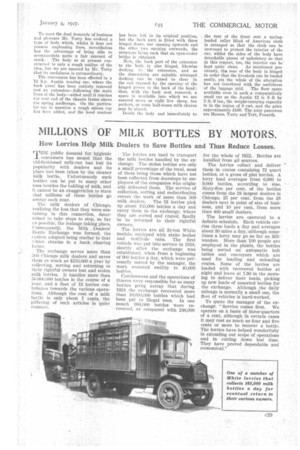MILLIONS OF MILK BOTTLES BY MOTORS.
Page 51

If you've noticed an error in this article please click here to report it so we can fix it.
How Lorries Help Milk Dealers to Save Bottles and Thus Reduce Losses.
public demand for hygienic containers has meant that the old-fashioned milk-can has lost its popularity with dealers and its place has been taken by the cleaner milk bottle. Unfortunately such bottles can be put to many other uses besides the holding of milk, and it cannot be an exaggeration to state that millions of these bottles go astray each year.
The milk dealers of Chicago, realizing the loss that they were sustaining in this connection, determined to take steps to stop, so far as possible, the leakage taking place. Consequently, the Milk . Dealers' Bottle Exchange was formed, the system adopted being similar to that Ishich obtains in a bank clearing houss.
The exchange serves more than 500 Chicago milk dealers and saves them as much as $250,000 a year by collecting, sorting and returning to their rightful owners lost and stolen milk bottles. It handles more than 50.000,000 bottles in the course of a year, and a fleet of 13 lorries contributes towards the various -operations. Although the cost of a milk bottle is only about 7 cents, the pilfering of such articles is quite common. The lorries are used to transport the milk bottles handled by the exchange. The stolen bottles are only a small percentage of the total, most of them being those which have not been collected from doorsteps by employees of the companies who originally delivered them. The service of collection, sorting and redistribution covers the work of more than 500 milk dealers. The 13 lorries pick up about 165,000 bottles a day and carry them to the exchange, where they are sorted and crated, finally to be returned to their rightful owners.
The lorries are all 3-ton White models, equipped with stake bodies and vestibule cabs. The first vehicle was put into service in 1919, shortly after the exchange was established, when from a beginning of 900 bottles a day, which were personally sorted by the manager, the work mounted swiftly to 40,000 bottles.
Carelessness and the operations of thieves were responsible for so many bottles going astray that during 1924 the exchange recovered more than 10,000,000 bottles which had been put to illegal uses. In one month 989,000 bottles were recovered, as compared with 248,000 for the whole of 1922. Bottles are handled from all sources.
The lorries collect and deliver them in crates containing 72 quart bottles, or a gross of pint bottles. A lorry load averages from 6,000 to 9,000 bottles, according to size. Sixty-five per cent, of the bottles comes from the 28 largest dealers in Chicago, 25 per cent. from the 28 dealers next in point of size of business, and 10 per cent, from more than 400 small dealers.
The lorries are operated to a definite schedule. Each vehicle carries three loads a day and averages about 30 miles a day, although sometimes a lorry may go as far as Milwaukee. More than 100 people are „employed in the plants, the bottles being sorted mi automatic belt tables and conveyors which are used for loading and unloading crates. Some of the lorries are loaded with recovered bottles at night and leave at 7.30 in the morning to deliver their loads, picking up new loads of unsorted bottles for the exchange. Although the daily mileage is normally a small one, the fleet of vehicles is hard-worked.
To quote the manager of the exchange. "Service comes first. We operate on a basis of three-quarters of a cent, although in certain cases it may cost as much as four and five cents or more to recover a bottle. The lorries have helped wonderfully In extending our scope of operations and in cutting down lost time. They have proved dependable and economical."












































































































